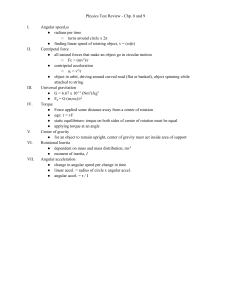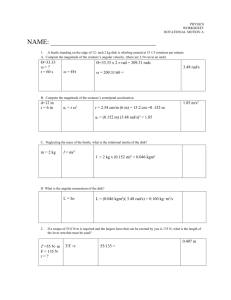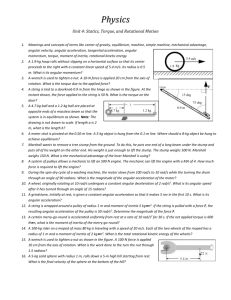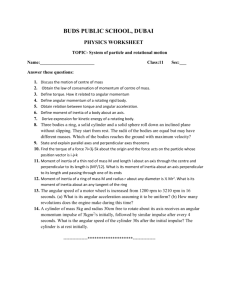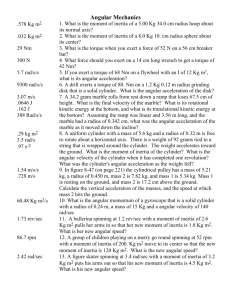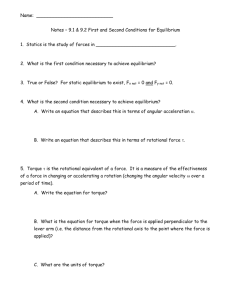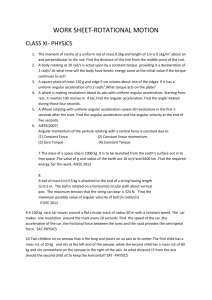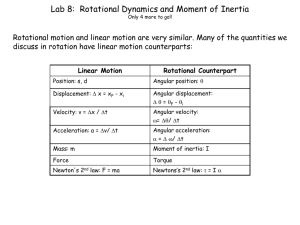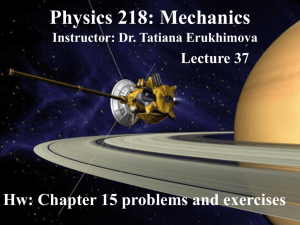02-01AngularDynamics
advertisement
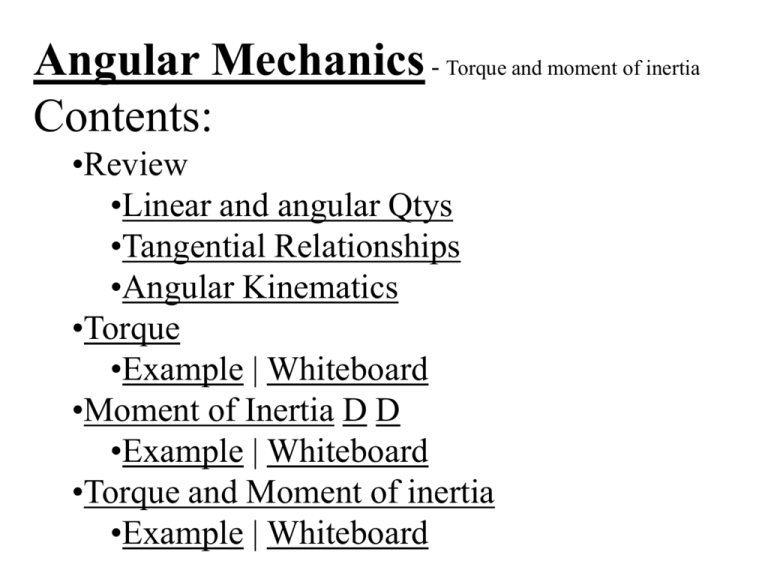
Angular Mechanics - Torque and moment of inertia Contents: •Review •Linear and angular Qtys •Tangential Relationships •Angular Kinematics •Torque •Example | Whiteboard •Moment of Inertia D D •Example | Whiteboard •Torque and Moment of inertia •Example | Whiteboard Angular Quantities Linear: (m) s (m/s) u (m/s) v (m/s/s) a (s) t (N) F (kg) m Angular: - Angle (Radians) o - Initial angular velocity (Rad/s) - Final angular velocity (Rad/s) - Angular acceleration (Rad/s/s) t - Uh, time (s) - Torque I - Moment of inertia Tangential Relationships Linear: (m) s (m/s) v (m/s/s) a Tangential: (at the edge of the wheel) = r - Displacement = r - Velocity = r - Acceleration Angular kinematics Linear: u + at = v ut + 1/2at2 = s u2 + 2as = v2 (u + v)t/2 = s ma = F Angular: = o + t = ot + 1/2t2 2 = o2 + 2 = (o + )t/2* = I *Not in data packet Torque Torque A twisting force that can cause an angular acceleration. So how do you increase torque? Push farther out: Push with more force: F or F Torque Torque A twisting force that can cause an angular acceleration. = rxF F r If r = 0.50 m, and F = 80 N, then = (.5m)(80N) = 40. mN. Torque is also in foot pounds (Torque Wrenches) Torque Torque A twisting force that can cause an angular acceleration. = rxF = rFsin F Fsin r Only the perpendicular component gives rise to torque. (That’s why it’s sin) Example: What’s the torque here? = 56o F = 16 N r = 24 cm Ok – This is as tricky as it can be: use = rFsin, r = 0.24 m, F = 16 N But is not 56o. You want to use the angle between r and F which is 90 – 56 = 34o Finally, = (.24 m)(16 N)sin(34o) = 2.1 mN OK, so you know about torque, Which set of gears is easier to use then? Gears on your bicycle 11 Whiteboards: Torque 1|2|3 What is the torque when you have 25 N of force perpendicular 75 cm from the center of rotation? = rFsin = (.75 m)(25 N)sin(90o) = 18.75 mN = 19 mN 19 mN If you want 52.0 mN of torque, what force must you exert at an angle of 65.0o to the end of a 0.340 m long wrench? = rFsin 52 mN = (.34 m)(F) sin(65o) F =(52mN)/((.34m) sin(65o))=168.75 N F = 169 N 169 N The axle nut of a Volkswagen requires 200. foot pounds to loosen. How far out (in feet) from the center do you stand on the wrench if you weigh 145 lbs, and the wrench makes an angle of 21.0o with the horizontal? (Careful what you use for the angle) = rFsin, =90 - 21 = 69.0o 200. ft lbs = (r)(145 lbs) sin(90o) r = (200. ft lbs)/(145 lbs)/sin(90o) = 1.4774 feet r = 1.48 feet (1’ 5.7”) 1.48 feet Angular Mechanics – Moment of inertia Moment of Inertia - Inertial resistance to angular acceleration. Question - If the blue masses were identical, would both systems respond identically to the same torque applied at the center? Demo Angular Mechanics – Moment of inertia F = ma - We can’t just use “m” for “I” = I (The position of “m” matters!) F = ma rF = mar (Mult. by r) rF = m(r)r (a = r) = (mr2) = I ( = rF) So I = mr2 for a point mass, r from the center. r F Angular Mechanics – Moment of inertia What about a cylinder rotating about its Some parts are central axis? far from the axis Some parts are close to the axis In this case, I = 1/2mr2 (You need calculus to derive it) In general, you look them up in your book. Demos: TP, Solids Three main ones: ½mr2 - Cylinder (solid) mr2 - Hoop (or point mass) 2/ 2 – Sphere (solid) mr 5 Example: Three 40. kg children are sitting 1.2 m from the center of a merry-go-round that is a uniform cylinder with a mass of 240 kg and a radius of 1.5 m. What is its total moment of inertia? The total moment of inertia will just be the total of the parts: Children – use mr2 (assume they are points) MGR – use 1/2mr2 (solid cylinder) I = 3((40kg)(1.2m)2) + ½(240kg )(1.5m)2 I = 442.8 kgm2 = 440 kgm2 Whiteboards: Moment of Inertia 1|2|3 What is the moment of inertia of a 3.5 kg point mass that is 45 cm from the center of rotation? I = mr2 I = (3.5kg)(.45m)2 = 0.70875 kgm2 I = 0.71 kgm2 0.71 kgm2 A uniform cylinder has a radius of 1.125 m and a moment of inertia of 572.3 kg m2. What is its mass? I = ½mr2 572.3 kgm2 = ½m(1.125 m)2 m = 2(572.3 kgm2)/(1.125 m)2 m = 904.375 = 904.4 kg 904.4 kg A sphere has a mass of 45.2 grams, and a moment of inertia of 5.537 x 10-6 kg m2. What is its radius? (2 Hints) m = 0.0452 kg I = 2/5mr2 5I/(2m) = r2 r = (5I/(2m))1/2 r = (5(5.537 r = 0.0175 m x10-6 0.0175 m 1/2 ) kgm2)/(2(.0452kg)) Angular Dynamics – Torque and moment of inertia Now let’s put it all together, we can calculate torque and moment of inertia, so let’s relate them: The angular equivalent of F = ma is: F = ma = I Example: A string with a tension of 2.1 N is wrapped around a 5.2 kg uniform cylinder with a radius of 12 cm. What is the angular acceleration of the cylinder? How many rotations will it make before it reaches a speed of 2300 RPM from rest? I = ½mr2 = ½(5.2kg)(.12m)2 = 0.03744 kg m2 = rF = (2.1N)(.12m) = 0.252 mN And = I, = /I = (.252 mN)/(0.03744 kgm2) = 6.73077 rad/s/s θ = (2300*2/60)2/2/(6.73077) = 4309.4 rad = 685.86 rev Whiteboards: Torque and Moment of Inertia 1|2|3|4|5 What torque is needed to accelerate a 23.8 kg m2 wheel at a rate of 388 rad/s/s? = I = (23.8 kgm2)(388 rad/s/s) I = 9234.4 mN = 9230 mN 9230 mN An object has an angular acceleration of 23.1 rad/s/s when you apply 6.34 mN of torque. What is the object’s moment of inertia? = I (6.34 mN) = I(23.1 rad/s/s) I = (6.34 mN)/(23.1 rad/s/s) = 0.274 kgm2 0.274 kgm2 If a drill exerts 2.5 mN of torque on a 0.075 m radius, 1.75 kg grinding disk, what is the resulting angular acceleration? (1 hint) = I, I = ½mr2 I = ½mr2 = ½(1.75 kg)(.075 m)2 = 0.004922 kgm2 = I, 2.5 mN = (.004922 kgm2) = /I = (2.5 mN)/(.004922 kgm2) = 510 rad/s/s 510 rad/s/s What torque would accelerate an object with a moment of inertia of 9.3 kg m2 from 2.3 rad/s to 7.8 rad/s in 0.12 seconds? (1 hint) = I, = o + t 7.8 rad/s = 2.3 rad/s + (.12 s) = (7.8 rad/s - 2.3 rad/s)/(.12 s) = 45.833s-2 = I = (9.3 kgm2)(45.833s-2) = 426.25 mN = 430 mN 430 mN A merry go round is a uniform solid cylinder of radius 2.0 m. You exert 30. N of force on it tangentially for 5.0 s and it speeds up from rest to 1.35 rad/s. What’s its mass? (1 hint) = rF, I = 1/2mr2 , = o+t, = I = 1.35 s-1/5.0 s = 0.27 rad/s/s = rF = 30.N(2.0m) = 60 mN = I, I= / (60mN)/(.27rad/s/s)=222.2kgm2 I = 1/2mr2, m = 2I/r2 m = 2(222.2kgm2)/(2.0m)2 = 111.1111 kg m = 110 kg 110 kg
